| Reviews & Columns |
|
Reviews DVD TV on DVD Blu-ray 4K UHD International DVDs In Theaters Reviews by Studio Video Games Features Collector Series DVDs Easter Egg Database Interviews DVD Talk Radio Feature Articles Columns Anime Talk DVD Savant Horror DVDs The M.O.D. Squad Art House HD Talk Silent DVD
|
DVD Talk Forum |
|
|
| Resources |
|
DVD Price Search Customer Service #'s RCE Info Links |
|
Columns
|
|
|
Untouchables: Season 2, Volume 2, The
Author's note: As regular consumers of TV on DVD know, the marketing gimmick of arbitrarily splitting up complete seasons of vintage TV series into two separately released volumes has become, regrettably, an increasingly common practice. Having written an in-depth review of The Untouchables: Season 2, Volume 1 back in June, and since stylistically and aesthetically, there is no difference between the first and second half of that particular 1960-1961 season, I've rewritten my original review of that season to cover this Volume 2 release - with additional extensive commentary added at the end, discussing specific episodes from this volume.
CBS DVD and Paramount have followed through and released The Untouchables: Season 2, Volume 2 on a four-disc, 16-episode set that should please fans of the gangbusting, rat-a-tat-tat actioner from the famed Desilu Studios. Starring Robert Stack as grim, humorless G-Man Eliot Ness, along with a host of excellent supporting players as various hoods, mobsters, psychotics and killers, The Untouchables: Season 2, Volume 2 metes out comic-book justice and violence with a refreshing vengeance.
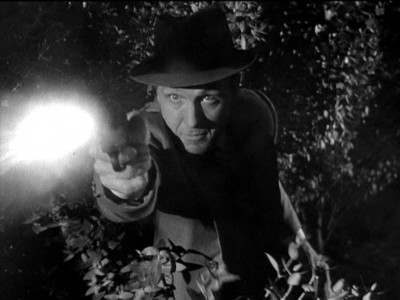
Admittedly, I was a little daunted at the task of reviewing this go-around of The Untouchables because previously, two of the best reviewers out there on vintage TV - DVDTalk's very own Stuart Galbraith IV and Phil Bacharach - had some mighty big reservations about the series, with the words "trite," "bland," "lethargic," "sluggish," and "wooden" used confidently despite the two's ultimate recommendation of the series. With those kinds of heavy-weight verdicts in the back of one's mind, a reviewer might start to think he's swimming against the tide when his own take on the show comes up on the other side. Watching The Untouchables, I found that I didn't necessarily disagree with Stuart's and Phil's pinpointing of the series' weaknesses - I just experienced those drawbacks differently.
Both Stuart and Phil provided excellent background on the show's production (please click here for Stuart's review, and here for Phil's), so I won't go into a lot of detail concerning the inception of the show. For newcomers to the series, however, The Untouchables, commissioned by that genuine TV genius Desi Arnez for his and his wife Lucille Ball's studio, Desilu, recounted the largely fictionalized accounts of real-life gangbuster Treasury Agent Eliot Ness, who, through the Bureau of Prohibition in Chicago, selected an elite team of incorruptible agents ("The Untouchables") charged with bringing down mob boss Al Capone. While his efforts at smashing Capone's illegal breweries did have an enormous impact on the crime leader's organization, it was actually agents working on a tax evasion angle that eventually nailed Capone. After Prohibition, Ness moved on to a job in local government in Cleveland, Ohio, tackling corruption and gangster activity there, returning briefly to work for the Feds in Washington before moving into the private sector. A memoir ghostwritten by Oscar Fraley largely re-wrote Ness' mob-fighting career, but it proved to be enormously popular, eventually spawning this ABC series. Ness died of alcoholism in 1957.
I mention that very brief rundown of Ness' career because you'll find almost none of that in this second season of The Untouchables. Fictionalized to the point of out-and-out fantasy (a fact that eventually caused the show to run disclaimers at the end of episodes due to pressure from, among other groups, former FBI men who objected to the show attributing their real-life efforts to Ness), the squeaky clean fictional Eliot Ness of The Untouchables bears little resemblance to the real-life Prohibition Agent whose career had many lows due to his drinking problem and his three divorces. His weekly exploits here are largely invented out of whole cloth, lifting real-life gangsters' names or events in mob history in order to plug in Ness and his Untouchables as a kind of roving, one-man crime-fighting machine of the entire Prohibition era.
While I would imagine most reviewers cool to the show didn't have a problem with this fictionalizing, I have noticed that a main bone of contention with The Untouchables is the portrayal of Ness himself, as essayed by resolute, emotionless, faintly inhuman Robert Stack. One-note in his performance to the point of almost kabuki-like stillness and gravity, Stack's Ness character is designed not so much as a living, breathing, emotionally layered person who engages in an epic battle with the mob, but as black-and-white enforcer of an ideal - justice - with no room for feelings or conflicts. The world exists, corruption is rampant, and Ness is a machine to bring that corruption to a halt. Of course, that kind of character construction can be viewed as distressingly flat and cardboard, as well. After decades of increasingly morally compromised "heroes" in our popular culture, Eliot Ness must look faintly ridiculous to viewers who want their heroes as divided and flawed as the times we live in today.
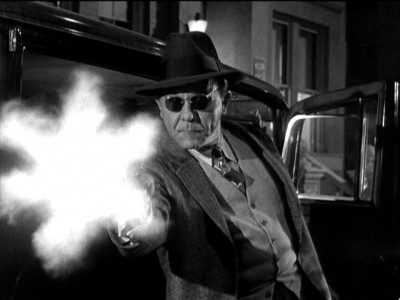
But precisely because of that throw-back nature of the Eliot Ness character, I found The Untouchables fairly exhilarating in its absolute refusal to bend to such shadings and gray-areas of characterizations. During The Untouchables original run from 1959 to 1963, the most popular, dominant genre on television - the western - had already moved firmly into its "adult" phase of psychologically-motivated, flawed characters operating within thinly disguised morality plays based on current sociological and societal concerns. But The Untouchables is having none of that. Entrenched in the bygone days of Prohibition, the show is immediately removed from then-current reality (a grim reality of the Cold War and the eminent threat of nuclear holocaust) right from the start, creating a storybook feeling to its structure that's heightened by the use of narration by Walter Winchell. With its period clothes, cars, and sets, The Untouchables is fantasy sifted through fable, reassuringly quaint and manageable with its small-time concerns (next to the A-Bomb) of Tommyguns and rumrunners. And therefore, The Untouchables works quite well within the confines of absolutes like "Good versus Evil," and "Right versus Wrong."
The Untouchables is a comic book vision of a world ruled by overwhelming violence and retribution, so the colorless, saintly Eliot Ness works perfectly as a relentless agent of destruction against the irredeemable foes of a civilized society. This isn't to say this adamantly one-note hero is preferable to a flawed, more recognizable and therefore, more sympathetic hero characterization - he's just determinedly "different" by comparison, and considering the increasingly sticky morass of hero/villains that are paraded in front of viewers then and now, a refreshing change of pace. As well, the rigidity and formalism of the show's structure and scripts - not at all unlike Jack Webb's production of Dragnet - works equally well within this comic-book fantasy, back during the era when published comic books had yet to fully incorporate into their heroes the psychological motivations and tensions increasingly found in other areas of popular culture.
There's a primitive power to the kind of elemental formalism of The Untouchables, which comes together perfectly in the bleak, solemn thesping of Robert Stack, in the thematic sameness of the scripts week after week, and in the high-voltage, sickening (for its time) violence of its action scenes. No doubt this last consideration - the series' controversial violence - is the key to the coming together of this fantasy world. Without the constant array of tortures and killings (this season includes grisly deaths by strangulation, guns, fire, along with various tortures), without the jolt of adrenalin that's injected into each story every time the Untouchables break out their rods and blast the villains, the stories themselves would be largely devoid of any dramatic interest. If Ness and his equally anonymous unit are a "force," rather than real characters, they must operate as "Forces," as inevitable powers that will not be swayed by corruption, and will not be felled by bullets. They must have the power of a force of nature equal to the sadism of their enemies, which lies not only in their .38s and their Thompsons, but in their relentless drive forward, unencumbered by superfluous emotions or shadings of personalities. For me, this aesthetic of The Untouchables is visualized again and again in episode after episode (made even more apparent after watching this second volume of Season 2) where Ness and his men put themselves within harm's way to mow down their foes. Not content to stay back and "wait for back-up," Ness and the Untouchables dive head-first into a confrontation, choppers spitting bullets as they grimly go about their task of cutting down the villains. Watch their faces - particularly Stack's - during these gun battles: they're utterly devoid of expression. No grimaces of pain, no signs of worry, nor even signs of satisfaction when a punk goes squealing off a balcony in his death throes. These crude, electrifying sequences may not seem logical or realistic in comparison to today's action films, but they make perfect sense in a comic book world where Ness isn't a human being, but a sullen, ghastly Angel of Death, an enforcer of justice, an inevitable, unstoppable Force of Good wiping out absolute Evil.
The violence doesn't let up, thankfully, in this second volume of episodes from Season 2. Deaths are gruesome and violent, and plentiful, while Ness grimly carries on, wiping his feet on the punks who soil civilized society. And while I didn't find an episode in this second volume to match the near-perfection of primal violence meshed with ideology in The Big Train two-parter (from Volume 1), there are exceptionally good episodes here. Augie "The Banker" Ciamino is a timely piece on immigrant assimilation into the American culture, with the series by now being careful to delineate "good" Italians from gangsters. Gruesome deaths include death by rotgut whiskey and a particularly nasty chain beating administered by black sunglasses-wearing Harry Dean Stanton. The Underground Court, directed by Don Medford, has some fairly interesting visuals, along with the novelty in 1961 of seeing a character snort heroin right on camera (no wonder people went ape - both ways - over this program). Character actor William Fawcett is a hoot as an obstreperous motel manager, and Joan Blondell is excellent as a seriously screwed-up lady Bluebeard. The Nick Moses Story has the incredible sight of Ness, almost getting it in the head from a sniper, grabbing the dead body of a hood and using it - characteristically without any qualms - as a shield from the sniper's bullets. Wow!!
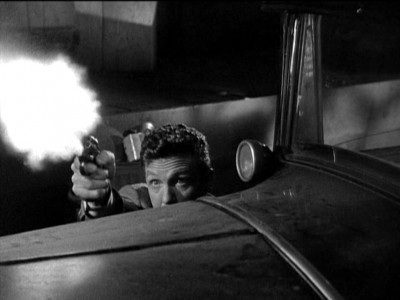
In The Antidote, there's a beautifully grotesque noir moment of crippled gangster, dragging his feet over to his victim before breaking a bottle and gutting his prey. The Lily Dallas Story features an agreeably horny performance by Norma Crane as a cold-blooded moll who enjoys cutting down her victims with a Tommy. Testimony of Evil has the always good (and slimy) David Brian as a murdering politician, while Ring of Terror plays like one of those solid Warner Bros. B-programmers about boxers and thugs and dames (excellent, spiffy direction by one of my favorite TV directors, Walter Grauman). Repulsive, wonderful Victor Buono has one of The Untouchables' greatest moments when, in a fit of uncontrollable rage, he beats a cohort to death with a whiskey flask and his bare hands (equally fine, precision-like direction by one of my other favorite TV directors, Paul Wendkos). Death for Sale is fun primarily for seeing Disney favorite good-guy James MacArthur play a vicious, amoral killer and dope peddler - who's dressed exactly like Archie Andrews from Riverdale. There's a great final scene, directed by Stuart Rosenberg (Cool Hand Luke), where MacArthur gradually flips out as Ness repeatedly rips apart MacArthur's teddy bears, looking for his dope. MacArthur makes a dash out the window, and the camera watches him from above try to run away on scrabbling legs, like a rat scurrying into a corner. Stranglehold has the always entertaining Ricardo Montalban (sans shirt, ladies, and looking ripped), as well as a number of grisly deaths, including asphyxiation by car exhaust fumes and acid thrown into someone's eyes.
Importantly, in The Nero Rankin Story (particularly in these "let's blame ourselves" times), there's a scene where Ness confronts an innocent victim and his family after the man was shot in anonymous retaliation by the mob (which is enraged by Ness's crime-fighting efforts). When the victim and family blame Ness, he turns it around on them, and tells them it's not his fault - but the criminals (amen, Robert Stack). The Seventh Vote has another nice, twisted noir moment when a gangster, dressed as a clown, stares grotesquely up at Ness, his body broken from a car accident. The King of Champagne has a suitably noir henchman: George Kennedy as a mute, deaf strangler, while The Nick Acropolis Story gets a super-charged jolt of electricity when Lee Marvin (fresh off of M Squad and on his way to movie superstardom) delivers one of his characteristically menacing/hilarious performances (laugh and cringe when Marvin, bathed in threatening shadows, comes snipping, snipping with his huge garden shears, quietly telling his victim, "I'm gonna cut your heart out, Frankie."). And while the final episode, 90-Proof Dame seems right in line with previous Untouchables episodes (a guy gets creamed in spectacular fashion by a truck that smacks into his phone booth), there's a startling development in Ness' character - at the very end of the episode - where he apologizes to gun moll Joanna Barnes for not believing she had turned over a new leaf ("I was wrong. I'm sorry.") Had Ness been reading Ann Landers??? We'll have to watch out for this suspect, troubling softening of the Ness character in the next season.
The Untouchables, premiering on perennial rating's loser ABC in October of 1959, didn't make much of a splash during its first season, coming in 43rd for the year in the Nielsen's (it probably lost a good bit of the earlier The Real McCoy's audience to fading lead-in Pat Boone's Chevy Showroom). But word of mouth was such concerning the levels of violence the series was showcasing week after week, along with the various controversies involving Italian-American groups who objected to the predominance of Italian-named criminals featured, that buzz increased significantly over the summer of 1960. Hit-starved ABC, no doubt encouraged by the various controversies (there's no such thing as bad press when you're running in last place) probably turned a blind eye to the show's almost perverse delight in coming up with new ways to ventilate the bad guys. Staying at its Thursday 9:30pm time slot, and with new lead-in (and soon to be major hit) My Three Sons, The Untouchables shot into the Top Ten, landing at number eight for the year. Alas, it was to be a short run, a flash-in-the pan one-season phenomenon after the series tumbled back into relative obscurity the next year. All kinds of theories were put forth as to why the series was tanking (including all the protestors who claimed victory in bringing down the violent show), but I wonder if it was, ultimately, doomed to be obsolete right from the start. A vicious, primal, elemental fable translated to the Prohibition era, it fascinated audiences for a season with its mesmerizing violence and its seductively blank, enigmatic hero, before audiences got the message and moved on.
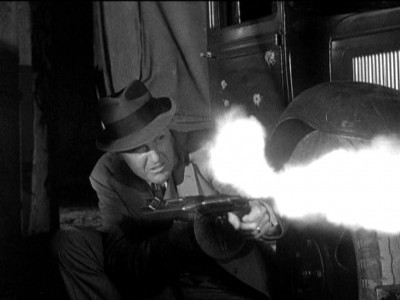
Here are the 16, one hour episodes of the four-disc box set, The Untouchables: Season 2, Volume 2, as described on the DVD insert. PLEASE NOTE: As with most vintage TV series released by CBS DVD/Paramount, there is a small disclaimer (smaller than normal, actually, with no prominent border box for this one) at the back of the DVD slimcase that states, "Some episodes may be edited from their original broadcast versions." There is no further explanation of what cuts, if any, were made. Some of the episodes do feature the end credits "fictionalized" disclaimer that Desilu eventually slapped on the The Untouchables episodes, but not on all the episodes here:
DISC ONE:
Augie "The Banker" Ciamino (February 9, 1961)
Little Italy is now making whiskey for the syndicate. But then a baker contacts Eliot Ness and defies the mob, even though his son is keeping their books.
The Underground Court (February 16, 1961)
A mobster has faked his own death in order to escape from his life of crime. But his eccentric female driving companion complicates his plan.
The Nick Moses Story (February 23, 1961)
Nick Moses promises Capone's underbosses that he will personally dispose of Ness...until the cabdriver father of a boy who was shot gets in the way.
The Antitdote (March 9, 1961)
A handicapped chemist can override the government's denaturing of alcohol with his latest formula, so he tries to exert his newfound power within the mob.
DISC TWO:
The Lily Dallas Story (March 16, 1961)
The wife of a mobster calls the shots in his gang, planning kidnappings and murder. But she didn't plan on the guilt she feels for deserting her child.
Murder Under Glass (March 23, 1961)
Ness travels to New Orleans, where a narcotics supplier has built himself a bulletproof car - to keep himself safe from the racketeers he plans to double-cross.
Testimony of Evil (March 30, 1961)
Without the testimony of a murdered witness, a crooked politician may go free. So Ness hopes to use the victim's girlfriend...if he can find her.
Ring of Terror (April 13, 1961)
After a fighter dies in the ring, Ness discovers he was drugged, but his manager isn't talking. Otherwise, the mob might divulge the truth about the manager's wife.
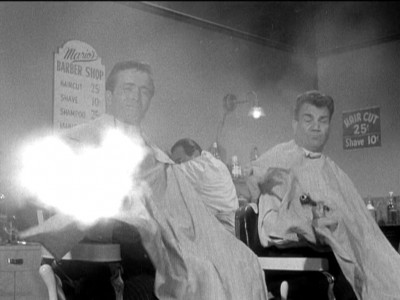
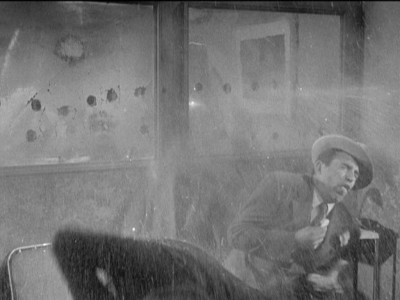
DISC THREE:
Mr. Moon (April 20, 1961)
Mr. Moon has figured out the perfect crime. He's stolen government paper stock and has sprung an expert counterfeiter from prison to manufacture money.
Death for Sale (April 27, 1961)
A kid barely out of his teens owns a string of clubs doubling as opium dens. Now his plan is to set up a mail-order business, concealing the drugs in stuffed animals.
Stranglehold (May 4, 1961)
As Ness works hard to bust up the mob's control of New York's fishing business, a powerful mob boss is ordered to sacrifice a key man in his organization.
The Nero Rankin Story (May 11, 1961)
With Nero Rankin the newly elected head of the underworld, Ness seems to be losing the good fight. But then Rankin comes to Ness with a strange request.
DISC FOUR:
The Seventh Vote (May 18, 1961)
Al Capone's crime council is split on how to proceed in business. So Capone orders them to smuggle his old mentor into America in order to break the tie.
The King of Champagne (May 25, 1961)
A bottle maker teams up with a well-connected Frenchman to sell champagne to all the ritzy clubs in Chicago. Then his greedy uncle wants in on the deal.
The Nick Acropolis Story (June 1, 1961)
A flower shop is a cover for a bookmaking business, whose cocky owner impresses Frank Nitti - until the bookie's brother-in-law betrays him.
90-Proof Dame (June 8, 1961)
A theater owner would like to make cheap cognac to compete with an expensive brand, but his former showgirl is now married to his wealthy competitor.
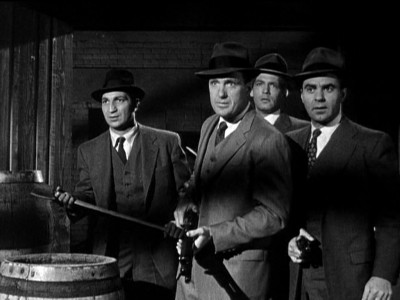
The DVD:
The Video:
The full-screen, 1.33:1 video transfers for The Untouchables: Season 2, Volume 2 on the whole look quite good; individual scenes within episodes, though, vary as to grain and clarity. One shot can look crystal clear, with razor sharp edges and beautifully gray-scaled tones, while the next shot can look soft with heavy grain. I can only assume this is inherent in the original film elements (or perhaps from too zealous digital cleaning up). Overall, though, The Untouchables: Season 2, Volume 2 looks quite good.
The Audio:
The Dolby Digital English mono audio mix accurately reflects the original broadcast presentation - unless Paramount made some changes to the mix (either music cues or bumper announcements) - which I'm unaware of. All dialogue is cleanly heard. There's a Spanish mono mix available, along with English, Spanish and Brazilian Portuguese subtitles.
The Extras:
There are, unfortunately, no extras for The Untouchables: Season 2, Volume 2.
Final Thoughts:
Comic book to be sure, but also brutal, primal, elemental. The deliberately square, resolutely humorless and grim The Untouchables: Season 2, Volume 2 plays like a ancient fable of absolutes, of "Good" versus "Evil" and "Right" versus "Wrong." The violence is scintillating, and its absolute refusal to be motivated by anything other than one-dimensional characterizations and motivations, is refreshingly exhilarating. Eliot Ness is a ghastly, inhuman, resolute Angel of Death, dispatched to rid civilization of the scum who foul it. Thank God. I highly recommend The Untouchables: Season 2, Volume 2.
Paul Mavis is an internationally published film and television historian, a member of the Online Film Critics Society, and the author of The Espionage Filmography.


|
| Popular Reviews |
| Sponsored Links |
|
|
| Sponsored Links |
|
|
| Release List | Reviews | Shop | Newsletter | Forum | DVD Giveaways | Blu-Ray | Advertise |
|
Copyright 2024 DVDTalk.com All Rights Reserved. Legal Info, Privacy Policy, Terms of Use,
Manage Preferences,
Your Privacy Choices | |||||||















